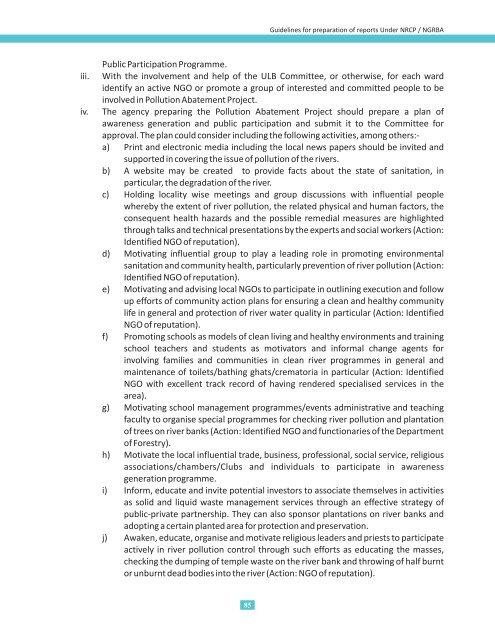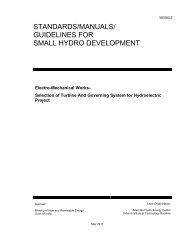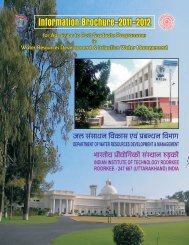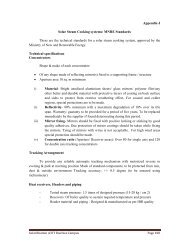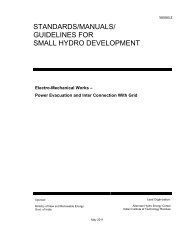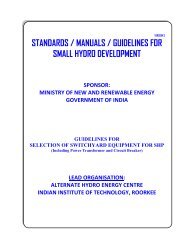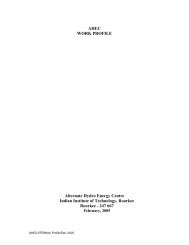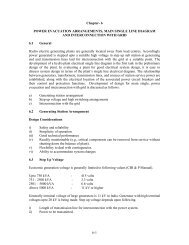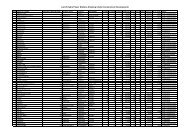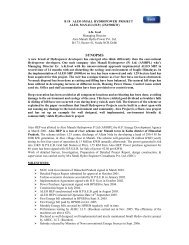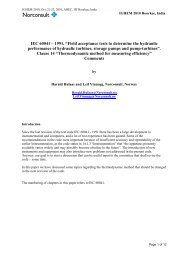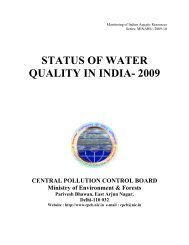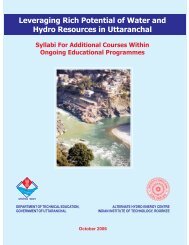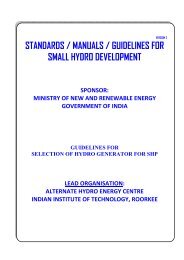annexures - Indian Institute of Technology Roorkee
annexures - Indian Institute of Technology Roorkee
annexures - Indian Institute of Technology Roorkee
You also want an ePaper? Increase the reach of your titles
YUMPU automatically turns print PDFs into web optimized ePapers that Google loves.
Guidelines for preparation <strong>of</strong> reports Under NRCP / NGRBAiii.iv.Public Participation Programme.With the involvement and help <strong>of</strong> the ULB Committee, or otherwise, for each wardidentify an active NGO or promote a group <strong>of</strong> interested and committed people to beinvolved in Pollution Abatement Project.The agency preparing the Pollution Abatement Project should prepare a plan <strong>of</strong>awareness generation and public participation and submit it to the Committee forapproval. The plan could consider including the following activities, among others:-a) Print and electronic media including the local news papers should be invited andsupported in covering the issue <strong>of</strong> pollution <strong>of</strong> the rivers.b) A website may be created to provide facts about the state <strong>of</strong> sanitation, inparticular, the degradation <strong>of</strong> the river.c) Holding locality wise meetings and group discussions with influential peoplewhereby the extent <strong>of</strong> river pollution, the related physical and human factors, theconsequent health hazards and the possible remedial measures are highlightedthrough talks and technical presentations by the experts and social workers (Action:Identified NGO <strong>of</strong> reputation).d) Motivating influential group to play a leading role in promoting environmentalsanitation and community health, particularly prevention <strong>of</strong> river pollution (Action:Identified NGO <strong>of</strong> reputation).e) Motivating and advising local NGOs to participate in outlining execution and followup efforts <strong>of</strong> community action plans for ensuring a clean and healthy communitylife in general and protection <strong>of</strong> river water quality in particular (Action: IdentifiedNGO <strong>of</strong> reputation).f) Promoting schools as models <strong>of</strong> clean living and healthy environments and trainingschool teachers and students as motivators and informal change agents forinvolving families and communities in clean river programmes in general andmaintenance <strong>of</strong> toilets/bathing ghats/crematoria in particular (Action: IdentifiedNGO with excellent track record <strong>of</strong> having rendered specialised services in thearea).g) Motivating school management programmes/events administrative and teachingfaculty to organise special programmes for checking river pollution and plantation<strong>of</strong> trees on river banks (Action: Identified NGO and functionaries <strong>of</strong> the Department<strong>of</strong> Forestry).h) Motivate the local influential trade, business, pr<strong>of</strong>essional, social service, religiousassociations/chambers/Clubs and individuals to participate in awarenessgeneration programme.i) Inform, educate and invite potential investors to associate themselves in activitiesas solid and liquid waste management services through an effective strategy <strong>of</strong>public-private partnership. They can also sponsor plantations on river banks andadopting a certain planted area for protection and preservation.j) Awaken, educate, organise and motivate religious leaders and priests to participateactively in river pollution control through such efforts as educating the masses,checking the dumping <strong>of</strong> temple waste on the river bank and throwing <strong>of</strong> half burntor unburnt dead bodies into the river (Action: NGO <strong>of</strong> reputation).85


